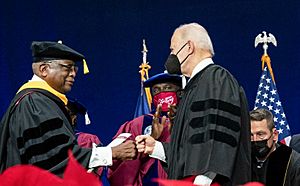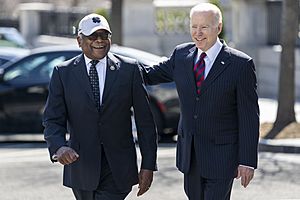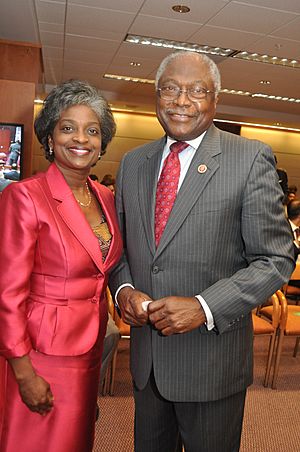Jim Clyburn facts for kids
Quick facts for kids
Jim Clyburn
|
|||||||||||||||||||||||||||||||||||||||||||||||||||||||||||||||
|---|---|---|---|---|---|---|---|---|---|---|---|---|---|---|---|---|---|---|---|---|---|---|---|---|---|---|---|---|---|---|---|---|---|---|---|---|---|---|---|---|---|---|---|---|---|---|---|---|---|---|---|---|---|---|---|---|---|---|---|---|---|---|---|
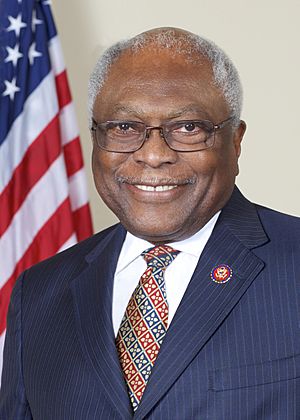
Official portrait, 2019
|
|||||||||||||||||||||||||||||||||||||||||||||||||||||||||||||||
| Member of the U.S. House of Representatives from South Carolina's 6th district |
|||||||||||||||||||||||||||||||||||||||||||||||||||||||||||||||
| Assumed office January 3, 1993 |
|||||||||||||||||||||||||||||||||||||||||||||||||||||||||||||||
| Preceded by | Robin Tallon | ||||||||||||||||||||||||||||||||||||||||||||||||||||||||||||||
|
|||||||||||||||||||||||||||||||||||||||||||||||||||||||||||||||
| Personal details | |||||||||||||||||||||||||||||||||||||||||||||||||||||||||||||||
| Born |
James Enos Clyburn
July 21, 1940 Sumter, South Carolina, U.S. |
||||||||||||||||||||||||||||||||||||||||||||||||||||||||||||||
| Political party | Democratic | ||||||||||||||||||||||||||||||||||||||||||||||||||||||||||||||
| Spouse |
Emily England
(m. 1961; died 2019) |
||||||||||||||||||||||||||||||||||||||||||||||||||||||||||||||
| Children | 3, including Mignon and Jennifer | ||||||||||||||||||||||||||||||||||||||||||||||||||||||||||||||
| Education | South Carolina State University (BA) | ||||||||||||||||||||||||||||||||||||||||||||||||||||||||||||||
| Awards | Presidential Medal of Freedom (2024) | ||||||||||||||||||||||||||||||||||||||||||||||||||||||||||||||
| Website | |||||||||||||||||||||||||||||||||||||||||||||||||||||||||||||||
James Enos Clyburn (born July 21, 1940) is an American politician. He serves in the United States House of Representatives for South Carolina's 6th district. He was first elected in 1992 and has been serving for over 30 years.
His district includes many of the state's majority-Black communities around the cities of Columbia and Charleston. Clyburn is currently the only Democrat from South Carolina serving in the U.S. Congress.
Clyburn has been a very important leader for the Democratic Party in the House. From 2007 to 2023, he was one of the top three House Democrats, along with Nancy Pelosi and Steny Hoyer. He served as the House Majority Whip, a job where he helped make sure Democratic representatives voted together on important issues.
He played a key role in the 2020 United States presidential election. His endorsement of Joe Biden just before the South Carolina primary election helped Biden gain a lot of support. This momentum helped Biden win the Democratic nomination and later become president.
Contents
Early Life and Schooling
James Clyburn was born in Sumter, South Carolina. His father, Enos Lloyd Clyburn, was a minister, and his mother, Almeta Dizzley, was a beautician.
Clyburn went to Mather Academy in Camden, South Carolina. For college, he attended South Carolina State College (now South Carolina State University), which is a historically black college. He earned a degree in history. After graduating, he worked as a teacher at C.A. Brown High School in Charleston.
Beginning a Career in Politics
Clyburn first got into politics during a hospital workers' strike in Charleston in 1969. He helped St. Julian Devine run for city council. Clyburn created the slogan "Devine for Ward Nine." Devine won, becoming the first African American on the city council since the Reconstruction era.
In 1971, South Carolina's Governor John C. West asked Clyburn to be his advisor. This made Clyburn the first nonwhite advisor to a governor in the state's history.
Later, he became the state's human affairs commissioner. He held this job until 1992, when he decided to run for the U.S. Congress.
Serving in the U.S. House of Representatives

How He Got Elected
In 1992, the boundaries for South Carolina's congressional districts were redrawn. The 6th district was changed to include more Black voters. The congressman at the time, Robin Tallon, decided to retire.
Clyburn ran for the seat in the Democratic primary election and won with 55% of the vote. He then easily won the main election in November. This made him the first African American to represent South Carolina in Congress in nearly 100 years. He has been reelected many times since then.
His Work in Congress
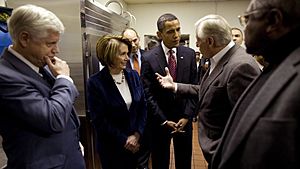
As a congressman, Clyburn has focused on many issues, including healthcare, education, and the environment. He is seen as a leading voice in the Democratic Party.
Party Leadership
Clyburn has held several leadership roles in the House Democratic Caucus. In 2006, he was elected Majority Whip after the Democrats won control of the House. The whip's job is to "whip up" votes and make sure party members vote together.
When Republicans took control of the House in 2011, Clyburn became the Assistant Democratic Leader. He returned to the Majority Whip role in 2019 when Democrats regained the majority.
Healthcare Ideas
In 2009, Clyburn introduced the Access for All Americans Act. This law aimed to provide billions of dollars to build more community health centers. These centers offer medical care to people with low incomes or no health insurance.
Focus on Education
Clyburn has worked to get more money for education. He has supported funding for special education programs and has worked to make student loans cheaper. He has also supported Pell Grants, which help students pay for college.
Support for Workers
Clyburn has a strong record of supporting workers' rights. He has consistently voted to raise the minimum wage. He also supports the right of workers to form labor unions. Many major unions have given him high ratings for his work.
Environmental Views
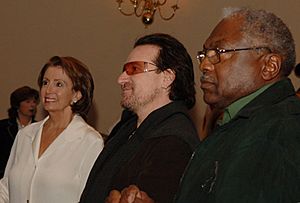
Clyburn has opposed drilling for oil and gas off the coast. He has supported using nuclear power as an alternative to fossil fuels like oil and coal. He believes nuclear energy is a cheaper clean energy source than wind or solar power.
Presidential Endorsements
Clyburn is known as a "kingmaker" in South Carolina politics because his support can have a big impact on elections.
- 2008 Election: Clyburn was officially neutral for most of the primary between Hillary Clinton and Barack Obama. However, he voted for Obama in the South Carolina primary. He later had a disagreement with former President Bill Clinton over comments made during the campaign.
- 2016 Election: He endorsed Hillary Clinton for president.
- 2020 Election: Clyburn's endorsement of Joe Biden was a turning point in the Democratic primaries. Before his support, Biden's campaign was struggling. After the endorsement, Biden won the South Carolina primary by a large margin, which helped him win the nomination and the presidency.
- 2024 Election: Clyburn supported President Biden's campaign for reelection. When Biden withdrew from the race, Clyburn announced his support for Vice President Kamala Harris.
Personal Life
Clyburn was married to Emily England Clyburn, a librarian, from 1961 until she passed away in 2019. They had three daughters.
Their daughter Mignon Clyburn was appointed to the Federal Communications Commission (FCC) by President Obama. Another daughter, Jennifer Clyburn Reed, was appointed to a federal commission for the Southeast region.
In 2024, President Joe Biden awarded Clyburn the Presidential Medal of Freedom, one of the highest honors a civilian can receive.
See also
 In Spanish: Jim Clyburn para niños
In Spanish: Jim Clyburn para niños
 | Audre Lorde |
 | John Berry Meachum |
 | Ferdinand Lee Barnett |


